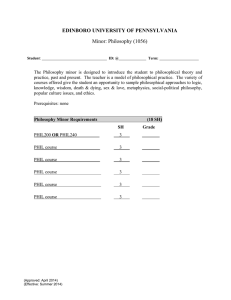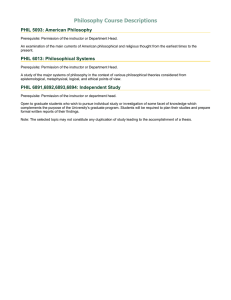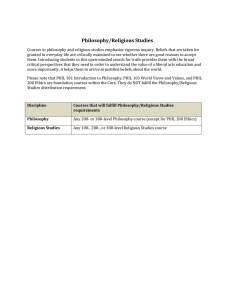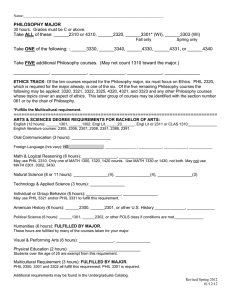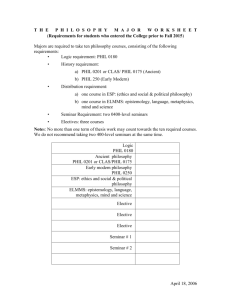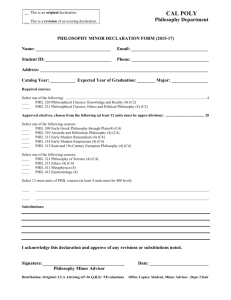Philosophy (BA) Curriculum Program Description
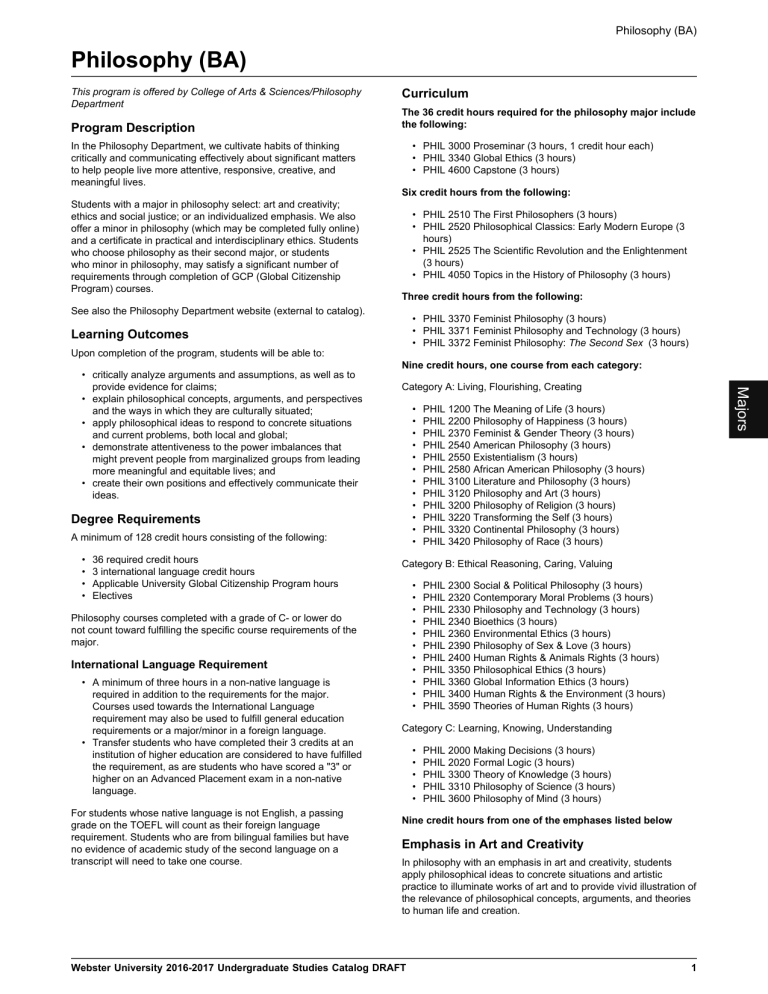
Philosophy (BA)
Philosophy (BA)
This program is offered by College of Arts & Sciences/Philosophy
Department
Program Description
In the Philosophy Department, we cultivate habits of thinking critically and communicating effectively about significant matters to help people live more attentive, responsive, creative, and meaningful lives.
Students with a major in philosophy select: art and creativity; ethics and social justice; or an individualized emphasis. We also offer a minor in philosophy (which may be completed fully online) and a certificate in practical and interdisciplinary ethics. Students who choose philosophy as their second major, or students who minor in philosophy, may satisfy a significant number of requirements through completion of GCP (Global Citizenship
Program) courses.
See also the Philosophy Department website (external to catalog).
Learning Outcomes
Upon completion of the program, students will be able to:
• critically analyze arguments and assumptions, as well as to provide evidence for claims;
• explain philosophical concepts, arguments, and perspectives and the ways in which they are culturally situated;
• apply philosophical ideas to respond to concrete situations and current problems, both local and global;
• demonstrate attentiveness to the power imbalances that might prevent people from marginalized groups from leading more meaningful and equitable lives; and
• create their own positions and effectively communicate their ideas.
Degree Requirements
A minimum of 128 credit hours consisting of the following:
• 36 required credit hours
• 3 international language credit hours
• Applicable University Global Citizenship Program hours
• Electives
Philosophy courses completed with a grade of C- or lower do not count toward fulfilling the specific course requirements of the major.
International Language Requirement
• A minimum of three hours in a non-native language is required in addition to the requirements for the major.
Courses used towards the International Language requirement may also be used to fulfill general education requirements or a major/minor in a foreign language.
• Transfer students who have completed their 3 credits at an institution of higher education are considered to have fulfilled the requirement, as are students who have scored a "3" or higher on an Advanced Placement exam in a non-native language.
For students whose native language is not English, a passing grade on the TOEFL will count as their foreign language requirement. Students who are from bilingual families but have no evidence of academic study of the second language on a transcript will need to take one course.
Curriculum
The 36 credit hours required for the philosophy major include the following:
• PHIL 3000 Proseminar (3 hours, 1 credit hour each)
• PHIL 3340 Global Ethics (3 hours)
• PHIL 4600 Capstone (3 hours)
Six credit hours from the following:
• PHIL 2510 The First Philosophers (3 hours)
• PHIL 2520 Philosophical Classics: Early Modern Europe (3 hours)
• PHIL 2525 The Scientific Revolution and the Enlightenment
(3 hours)
• PHIL 4050 Topics in the History of Philosophy (3 hours)
Three credit hours from the following:
• PHIL 3370 Feminist Philosophy (3 hours)
• PHIL 3371 Feminist Philosophy and Technology (3 hours)
• PHIL 3372 Feminist Philosophy: The Second Sex (3 hours)
Nine credit hours, one course from each category:
Category A: Living, Flourishing, Creating
• PHIL 1200 The Meaning of Life (3 hours)
• PHIL 2200 Philosophy of Happiness (3 hours)
• PHIL 2370 Feminist & Gender Theory (3 hours)
• PHIL 2540 American Philosophy (3 hours)
• PHIL 2550 Existentialism (3 hours)
• PHIL 2580 African American Philosophy (3 hours)
• PHIL 3100 Literature and Philosophy (3 hours)
• PHIL 3120 Philosophy and Art (3 hours)
• PHIL 3200 Philosophy of Religion (3 hours)
• PHIL 3220 Transforming the Self (3 hours)
• PHIL 3320 Continental Philosophy (3 hours)
• PHIL 3420 Philosophy of Race (3 hours)
Category B: Ethical Reasoning, Caring, Valuing
• PHIL 2300 Social & Political Philosophy (3 hours)
• PHIL 2320 Contemporary Moral Problems (3 hours)
• PHIL 2330 Philosophy and Technology (3 hours)
• PHIL 2340 Bioethics (3 hours)
• PHIL 2360 Environmental Ethics (3 hours)
• PHIL 2390 Philosophy of Sex & Love (3 hours)
• PHIL 2400 Human Rights & Animals Rights (3 hours)
• PHIL 3350 Philosophical Ethics (3 hours)
• PHIL 3360 Global Information Ethics (3 hours)
• PHIL 3400 Human Rights & the Environment (3 hours)
• PHIL 3590 Theories of Human Rights (3 hours)
Category C: Learning, Knowing, Understanding
• PHIL 2000 Making Decisions (3 hours)
• PHIL 2020 Formal Logic (3 hours)
• PHIL 3300 Theory of Knowledge (3 hours)
• PHIL 3310 Philosophy of Science (3 hours)
• PHIL 3600 Philosophy of Mind (3 hours)
Nine credit hours from one of the emphases listed below
Emphasis in Art and Creativity
In philosophy with an emphasis in art and creativity, students apply philosophical ideas to concrete situations and artistic practice to illuminate works of art and to provide vivid illustration of the relevance of philosophical concepts, arguments, and theories to human life and creation.
Webster University 2016-2017 Undergraduate Studies Catalog DRAFT 1
2
Philosophy (BA)
Philosophy (BA)
Emphasis-Specific Learning Outcomes
Upon completion of the program, students will be able to explain philosophical concepts, arguments, and perspectives—especially those related to art and creativity—and the ways in which they are culturally situated.
Art and Creativity emphasis requirements
6 credit hours from the following:
• PHIL 3100 Literature and Philosophy (3 hours)
• PHIL 3110 Philosophy and Film (3 hours)
• PHIL 3120 Philosophy and Art (3 hours)
• PHIL 3220 Transforming the Self (3 hours)
3 hours from the following:
• ART 1000 Introduction to Studio Art (3 hours)
• ART 1010 Creative Strategies (3 hours)
• ART 1110 Introduction to Drawing (3 hours)
• DESN 1210 Design Concepts (3 hours)
• AUDI 1000 Audio Production I for Non-Majors (3 hours)
• AUDI 1100 Audio Production I for Majors (3 hours)
• CONS 1010 Conservatory I 8 hours
• THEA 1080 Studio Acting I (3 hours)
• DANC 1010 Ballet I (2 hours)
• DANC 1020 Ballet II (2 hours)
• DANC 1090 Jazz I (1-2 hours)
• DANC 1100 Jazz II (1-2 hours)
• DANC 1110 Modern I 1-2 hours
• DANC 1120 Modern II 1-2 hours
• DANC 1220 Improvisation (2 hours)
• DANC 1230 Tap Dance I (2 hours)
• DANC 1240 Tap Dance II (2 hours)
• DANC 1550 Stagecraft for Dance (3 hours)
• EPMD 1000 Introduction to Media Production (3 hours)
• EPMD 1010 Introduction to Media Production for Journalism
(3 hours)
• FILM 1000 Filmmaking Fundamentals (3 hours)
• PHOT 1000 Photo I (3 hours)
• PHOT 1010 Digital Basic Photography (3 hours)
• VIDE 1000 Introduction to Video Production (3 hours)
• ENGL 2150 Creative Writing: Poetry (3 hours)
• ENGL 2160 Creative Writing: Fiction (3 hours)
• ENGL 2170 Creative Writing: Playwriting (3 hours)
• ENGL 2180 Creative Writing: Nonfiction (3 hours)
• ENGL 2190 Creative Writing: Translation (3 hours)
• MUSC 1080 Beginning Class Piano (2 hours)
• MUSC 1085 Intermediate Class Piano (2 hours)
• MUSC 1090 Beginning Guitar (2 hours)
• MUSC 1095 Intermediate Guitar (2 hours)
• MUSC 2000 Applied Music: Secondary and Non-Major (2 hours)
• MUSC 2001 Applied Piano: Secondary and Non-Major (2 hours)
• MUSC 2002 Applied Voice: Secondary and Non-Major (2 hours)
• MUSC 2126 Class Voice (2 hours)
• MUSC 4001 Applied Music: Piano (2-5 hours)
• MUSC 4002 Applied Music: Voice (2-5 hours)
• MUSC 4003 Applied Music: Jazz Studies (2-5 hours)
• MUSC 4004 Applied Music: Instrumental Studies (2-5 hours)
• MUSC 4005 Applied Music: Organ (2-5 hours)
• MUSC 4900 Webster University Concert Choir (1 hour)
• MUSC 4910 Webster University Chamber Singers (1 hour)
• MUSC 4920 Webster University Women’s Chorus (1 hour)
• MUSC 4940 Webster University Orchestra (1 hour)
• MUSC 4950 Webster University Chamber Music Ensembles
(1 hour)
• MUSC 4960 Webster University Jazz Ensembles (1-2 hours)
• MUSC 4970 Webster University Jazz Collective (1 hour)
• MUSC 4980 Webster University Wind Ensemble (1 hour)
• MUSC 4990 Webster University Opera Studio (1 hour)
Emphasis in Ethics and Social Justice
In philosophy with an emphasis in ethics and social justice, students apply philosophical ideas to respond to concrete situations and current ethical and social problems, both local and global.
Emphasis-Specific Learning Outcomes
Upon completion of the program, students will be able to explain philosophical concepts, arguments, and perspectives—especially those related to ethics and social justice—and the ways in which they are culturally situated.
Emphasis in Ethics and Social Justice requirements
9 credit hours from the following:
• ETHC 1000 Issues and Problems in Ethics (1 hour)
• ETHC 2000 Intermediate Issues in Ethics (3 hours)
• ETHC 3000 Advanced Issues in Ethics (3 hours)
• PHIL 2300 Social & Political Philosophy (3 hours)
• PHIL 2320 Cont. Moral Problems (3 hours)
• PHIL 2330 Philosophy and Technology (3 hours)
PHIL 2340 Bioethics (3 hours)
• PHIL 2360 Environmental Ethics (3 hours)
• PHIL 2370 Feminist & Gender Theory (3 hours)
• PHIL 2390 Philosophy of Sex and Love (3 hours)
• PHIL 2400 Human Rights and Animal Rights (3 hours)
• PHIL 2540 American Philosophy (3 hours)
• PHIL 2580 African American Philosophy (3 hours)
• PHIL 3360 Global Information Ethics (3 hours)
• PHIL 3400 Human Rights and the Environment (3 hours)
• PHIL 3420 Philosophy of Race and Ethnicity (3 hours)
• PHIL 3590 Theories of Human Rights (3 hours)
Individualized Emphasis
In philosophy with an individualized emphasis, students apply philosophical ideas to respond to a range of concrete situations and current problems of their choosing, both local and global.Students select elective courses in consultation with an advisor, reflecting on and documenting their learning in an emphasis portfolio.
Emphasis-specific learning outcomes are defined no later than a student’s junior year, in consultation with a full-time faculty member in the Philosophy department.
Individualized Emphasis Electives
Nine credit hours in courses with PHIL or ETHC prefixes, selected in consultation with a full-time faculty member in the Philosophy department.
Admission
Students who are interested in applying to this degree program should see the Admission Section of this catalog for general requirements.
Webster University 2016-2017 Undergraduate Studies Catalog DRAFT
